AALS Workshop Helps New Law Faculty Get Careers Off to a Great Start
AALS welcomed more than 70 new law school faculty to a specialized workshop June 6-8, 2019 in Washington, DC. The AALS Workshop for New Law School Teachers supports faculty in their transition into full-time teaching, as they learn to balance and embrace the competing demands of teaching, scholarship, and institutional service required in an academic career.
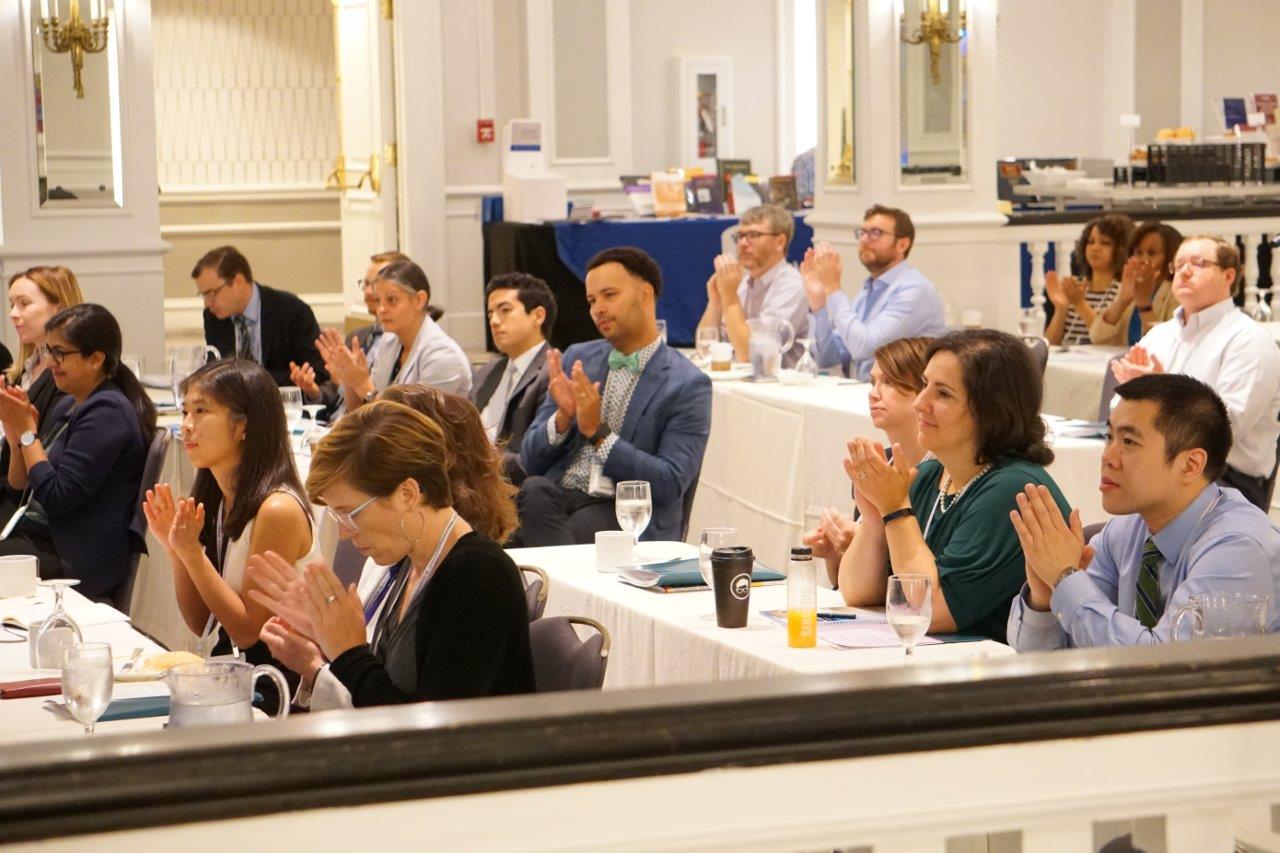 Attendees at the AALS Workshop for New Law School Teachers.
Attendees at the AALS Workshop for New Law School Teachers.
“I remember really well being in your seats and how much I gained from attending this workshop. I hope you’ll enjoy this conference as much as I did,” said workshop planning committee chair Susan Kuo (University of South Carolina Law) during welcoming remarks.
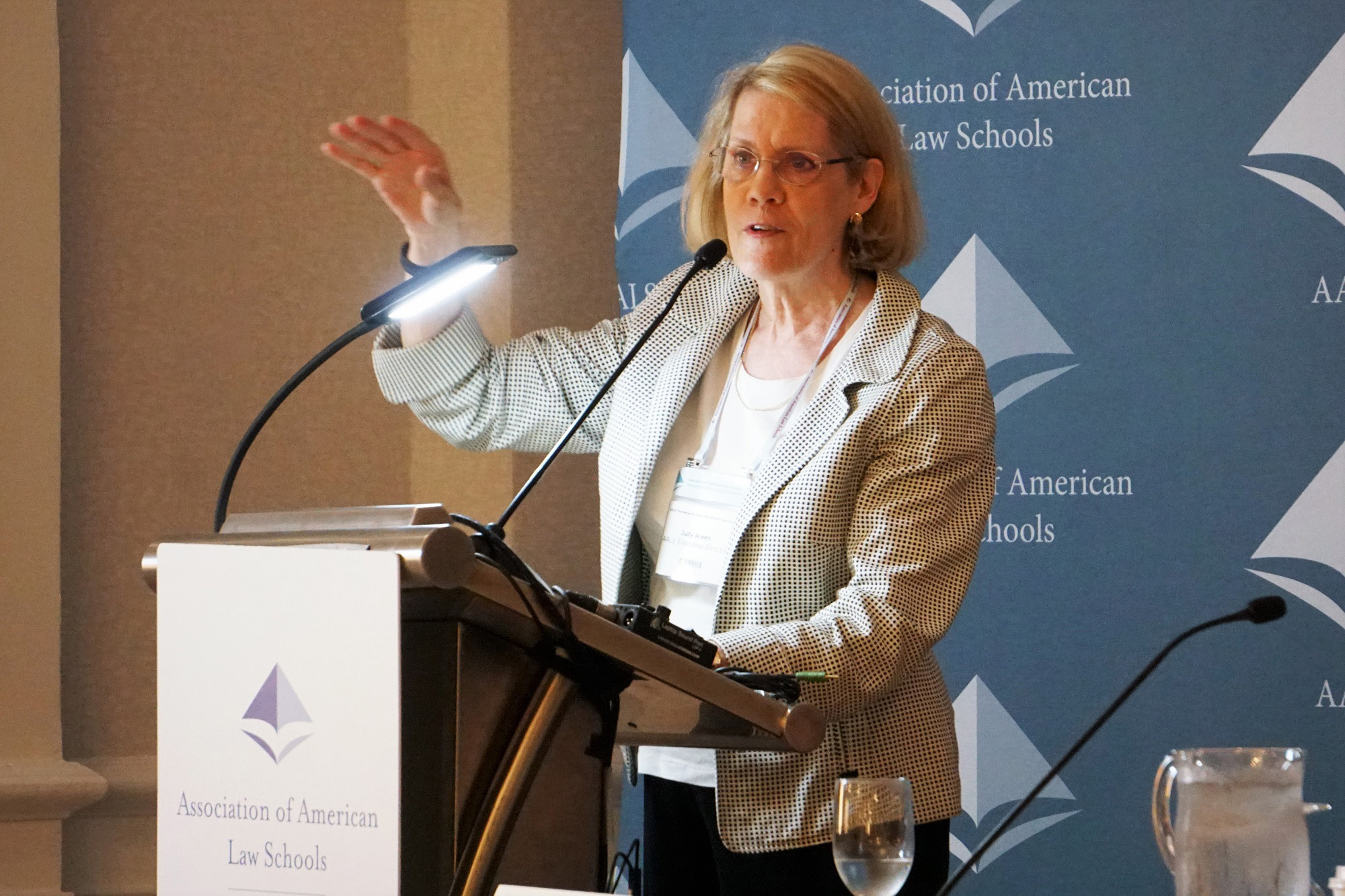 Judith Areen, Executive Director, Association of American Law Schools provides welcoming remarks to attendees of the AALS Workshop for New Law School Teachers.
Judith Areen, Executive Director, Association of American Law Schools provides welcoming remarks to attendees of the AALS Workshop for New Law School Teachers.
Programming officially began on the night of Thursday, June 6 with small group discussions among attendees. These groups navigated the workshop together and reconvened at the beginning of the final day. AALS then hosted an opening dinner, where Danielle Holley-Walker (Dean, Howard Law School) set the tone for the rest of the workshop with an address on “Defining Yourself for Yourself: How to Make the Most of Your Academic Career.”
“Be curious, find your voice, make an impact. It’s a lot to ask for, but every single one of you in this room are up to the task. I wish you a long and successful career in this distinguished profession,” said Dean Holley-Walker in her address.
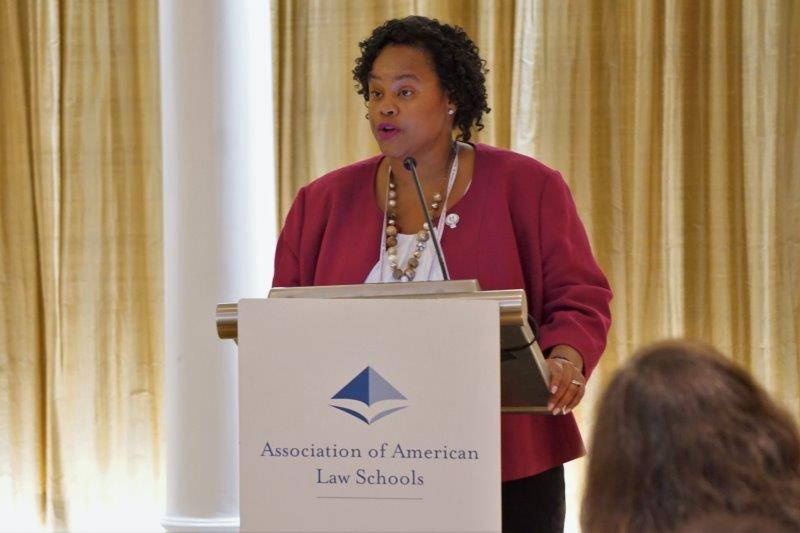 Danielle Holley-Walker (Dean, Howard Law) presents during Thursday’s dinner address, “Defining Yourself for Yourself: How to Make the Most of Your Academic Career.”
Danielle Holley-Walker (Dean, Howard Law) presents during Thursday’s dinner address, “Defining Yourself for Yourself: How to Make the Most of Your Academic Career.”
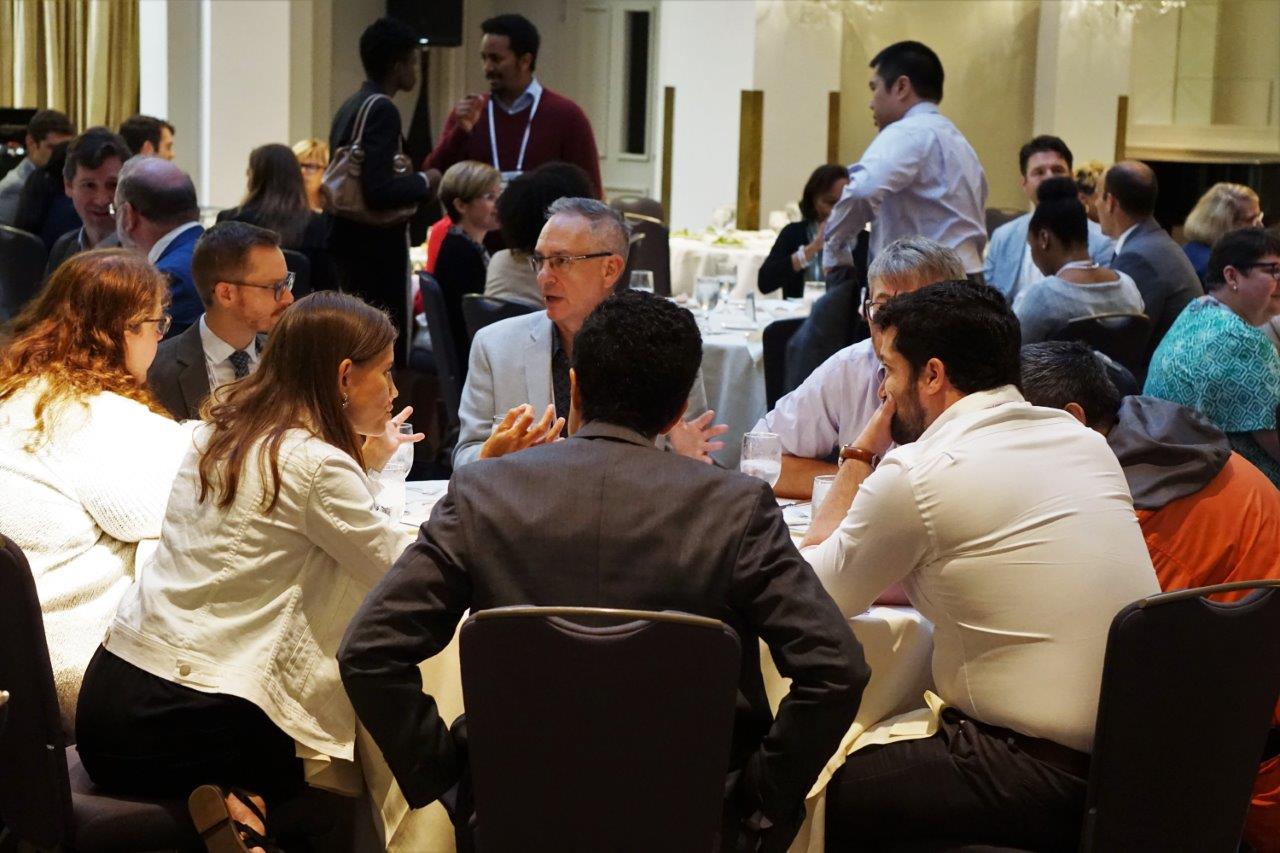 Attendees at the AALS Workshop for New Law Teachers Dinner on Thursday evening.
Attendees at the AALS Workshop for New Law Teachers Dinner on Thursday evening.
On Friday, workshop participants attended the plenary address on “Why Scholarship Matters,” from AALS President and Harvard Law Professor Vicki C. Jackson.
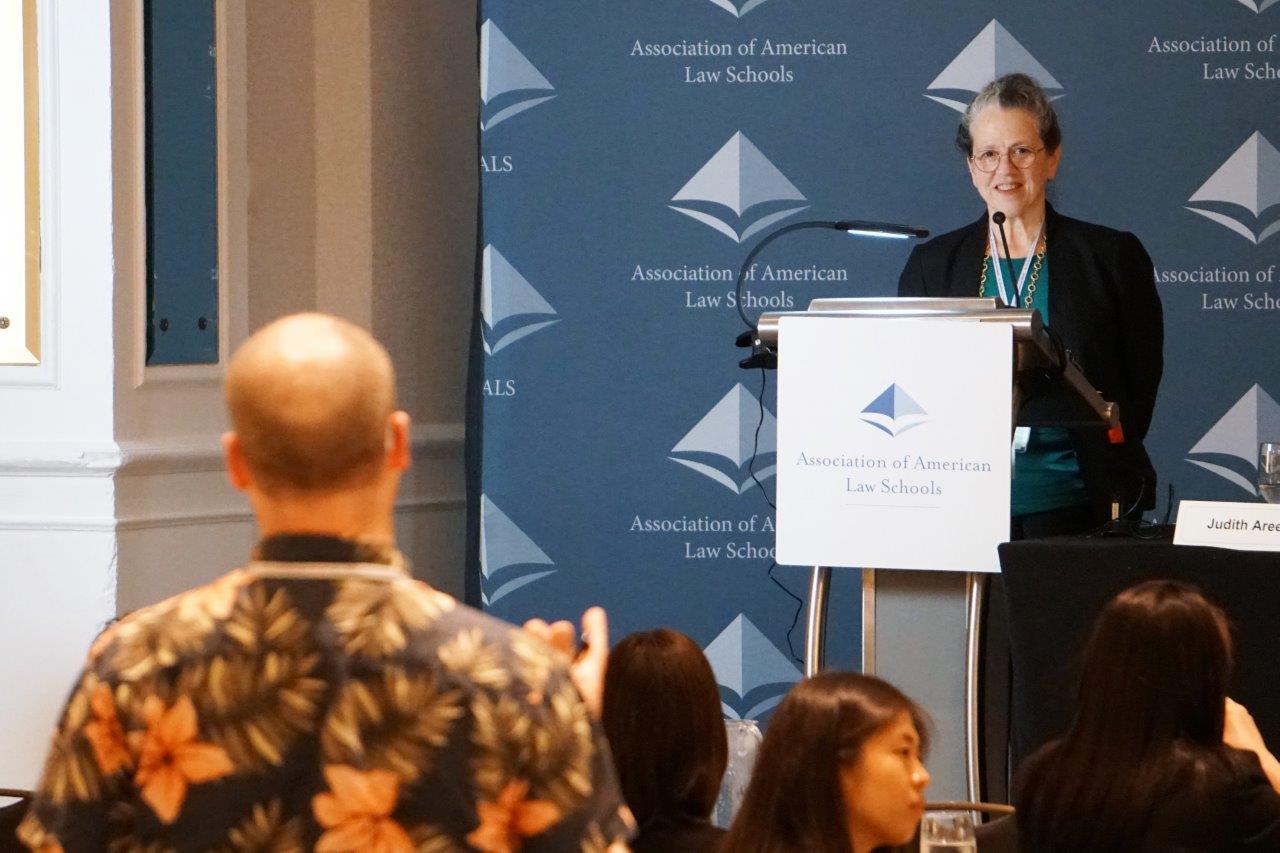 AALS President Vicki C. Jackson (Harvard Law) answers a question during the plenary session, “Why Scholarship Matters.”
AALS President Vicki C. Jackson (Harvard Law) answers a question during the plenary session, “Why Scholarship Matters.”
“We as legal scholars can sometimes write for the present, but we can also write for the long-haul,” Professor Jackson said. “[We hope] that even if our work does not influence current judges, lawyers and legislators, if we do good work, it may do so in the future.”
“Nowhere is the task of legal scholarship more urgent than in helping our society see truths about law, justice, and injustice – past, present, and future,” she continued.
Participants then spent the morning in breakout sessions on scholarship on designing a research agenda, building a scholarly network, distributing scholarly ideas, the challenges of interdisciplinary scholarship, engaged advocacy, and scholarship for legal writing faculty.
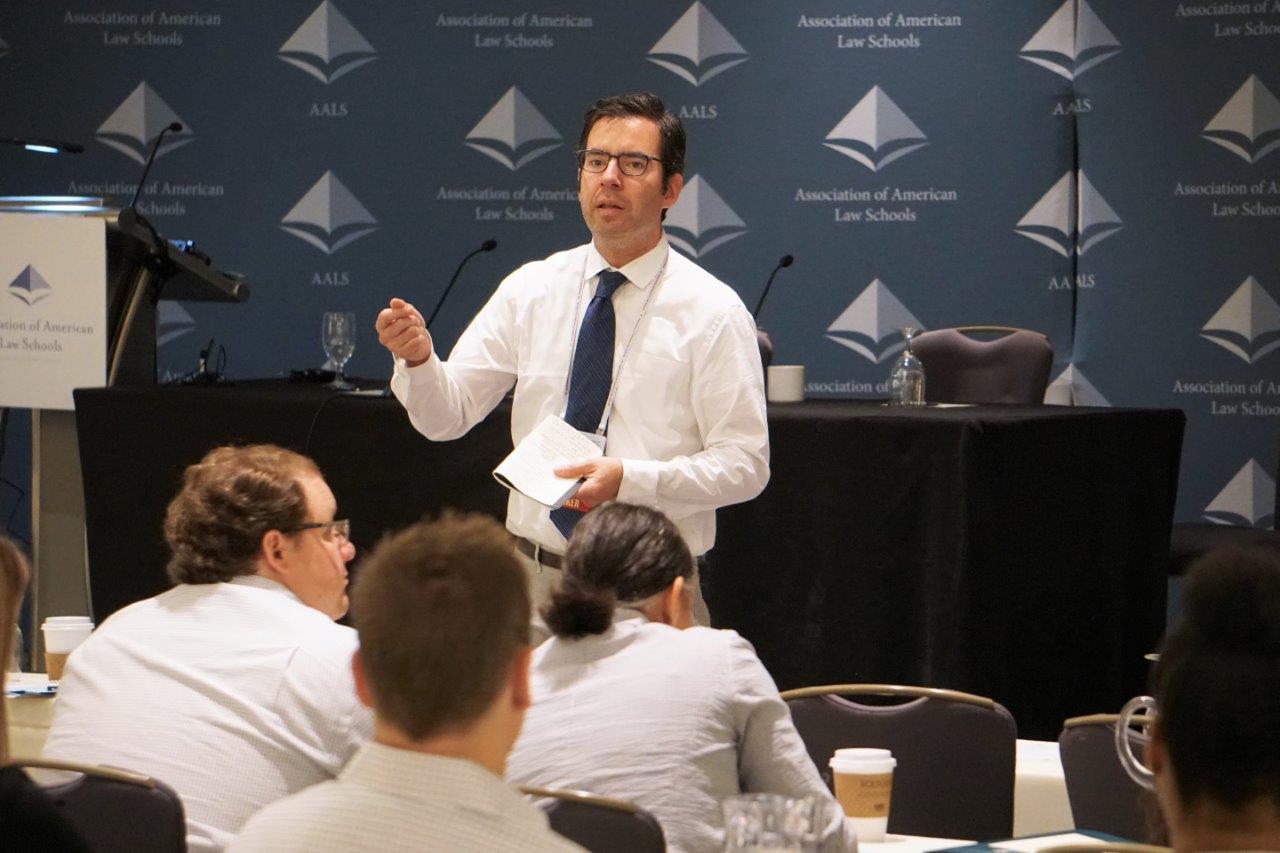 Benjamin Means (University of South Carolina Law) during the breakout session, “Designing Your Research Agenda.”
Benjamin Means (University of South Carolina Law) during the breakout session, “Designing Your Research Agenda.”
The programming broke for an AALS Luncheon, including a talk on “How to Become an Excellent Classroom Teacher” from Eloise Pasachoff (Georgetown Law), who reflected on her own experiences at the AALS Workshop for New Law School Teachers she attended. “I attended this workshop the summer before I started at Georgetown and found it fun and enriching. I’m still in touch with a lot of the people I met at that conference,” she said.
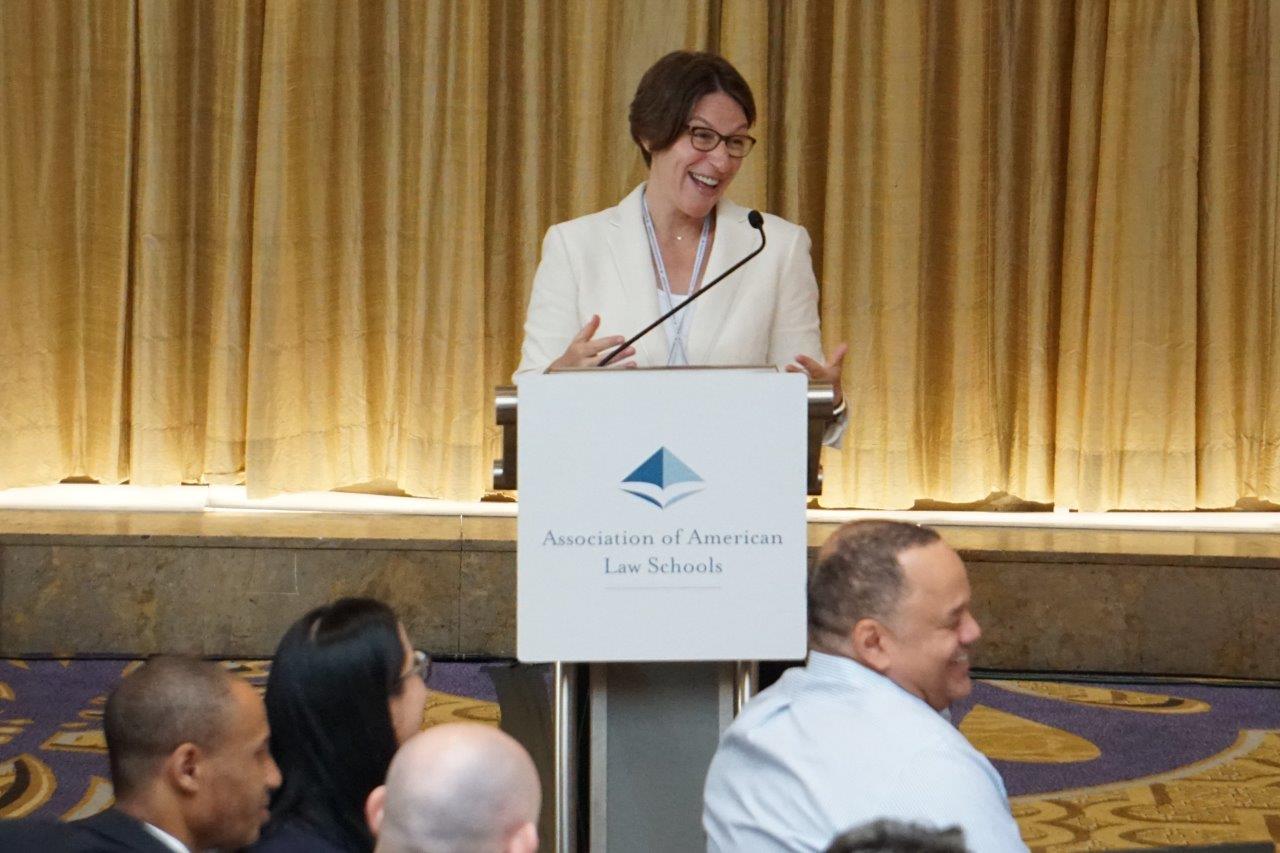 Eloise Pasachoff (Georgetown Law) presents “How to Become an Excellent Classroom Teacher,” during Friday’s lunch.
Eloise Pasachoff (Georgetown Law) presents “How to Become an Excellent Classroom Teacher,” during Friday’s lunch.
During her talk, Professor Pasachoff noted, “It is our job to help [law students] become the lawyers they want to be. It means pushing them hard and having high expectations, but it also means scaffolding the material for them in a way that brings them to where you want them to be.”
After lunch, Dean Michael Hunter Schwartz (University of the Pacific, McGeorge School of Law) delivered the afternoon plenary address on “Learning Theory.”
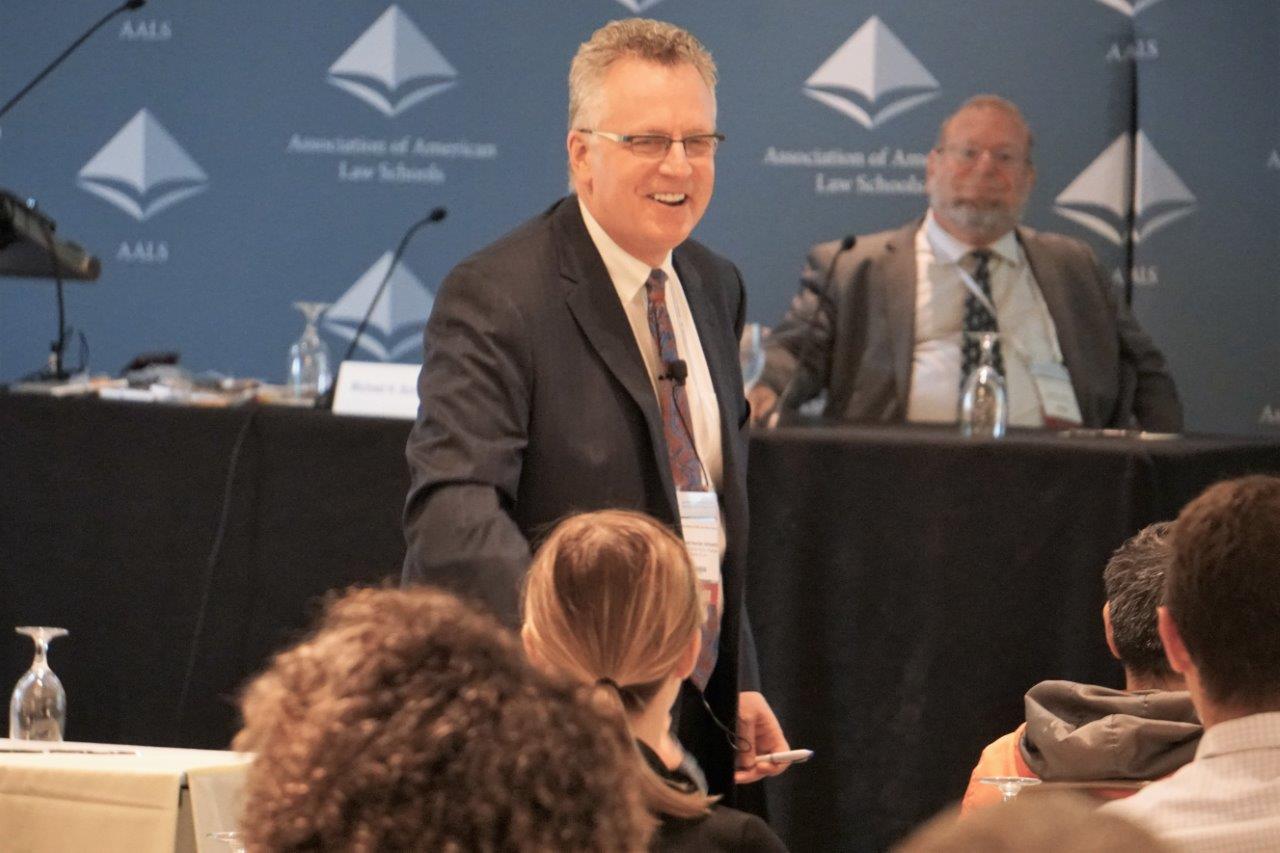 Michael Hunter Schwartz (Dean, Pacific McGeorge Law) and Aaron H. Caplan (Loyola Law School, Los Angeles) during a plenary session on learning theory.
Michael Hunter Schwartz (Dean, Pacific McGeorge Law) and Aaron H. Caplan (Loyola Law School, Los Angeles) during a plenary session on learning theory.
Afternoon breakout sessions on teaching included sessions on course design, effective teaching inside the classroom, mentorship and research supervision outside the classroom, teaching legal writing, and teaching with technology.
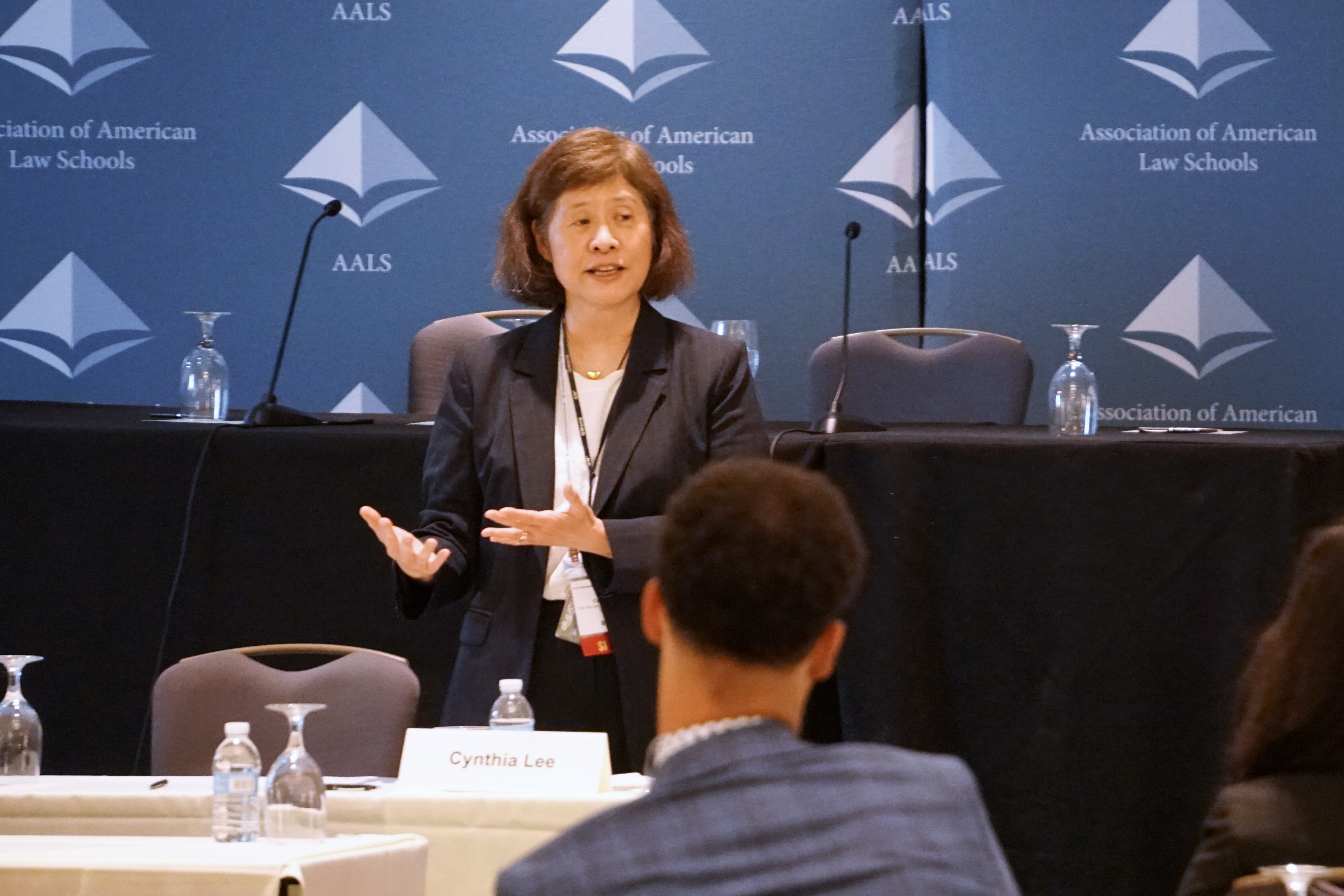 Cynthia Lee (George Washington Law) presents during the breakout session “Inside the Classroom.”
Cynthia Lee (George Washington Law) presents during the breakout session “Inside the Classroom.”
Before the day closed with a reception, the final plenary session covered “The Demands and Delights of Institutional Citizenship: Exploring a Range of Service Opportunities.” Speakers Okainer Christian Dark (Howard Law), Roger A. Fairfax, Jr. (George Washington Law), and Paul Ohm (Georgetown Law) dispensed critical advice on the topic.
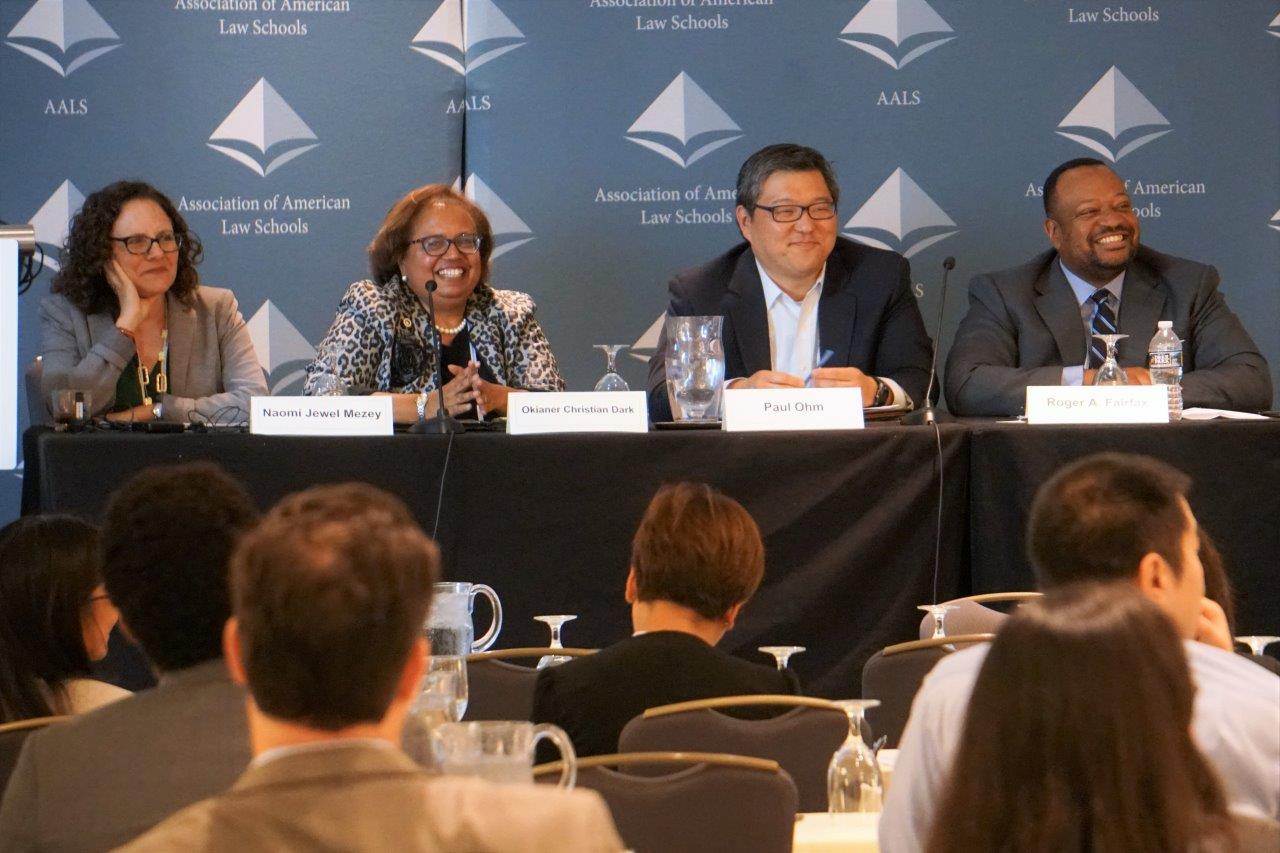 Panelists during the plenary session, “The Demands and Delights of Institutional Citizenship: Exploring a Range of Service Opportunities.” L-R: Naomi Jewel Mezey (Georgetown Law), Okianer Christian Dark (Howard Law), Paul Ohm (Georgetown Law), and Roger A. Fairfax, Jr. (George Washington Law.)
Panelists during the plenary session, “The Demands and Delights of Institutional Citizenship: Exploring a Range of Service Opportunities.” L-R: Naomi Jewel Mezey (Georgetown Law), Okianer Christian Dark (Howard Law), Paul Ohm (Georgetown Law), and Roger A. Fairfax, Jr. (George Washington Law.)
Time during the final day of the Workshop was spent in plenary sessions on inclusion in the classroom and student assessment, as well as a lunch address on work-life balance in the legal academy.
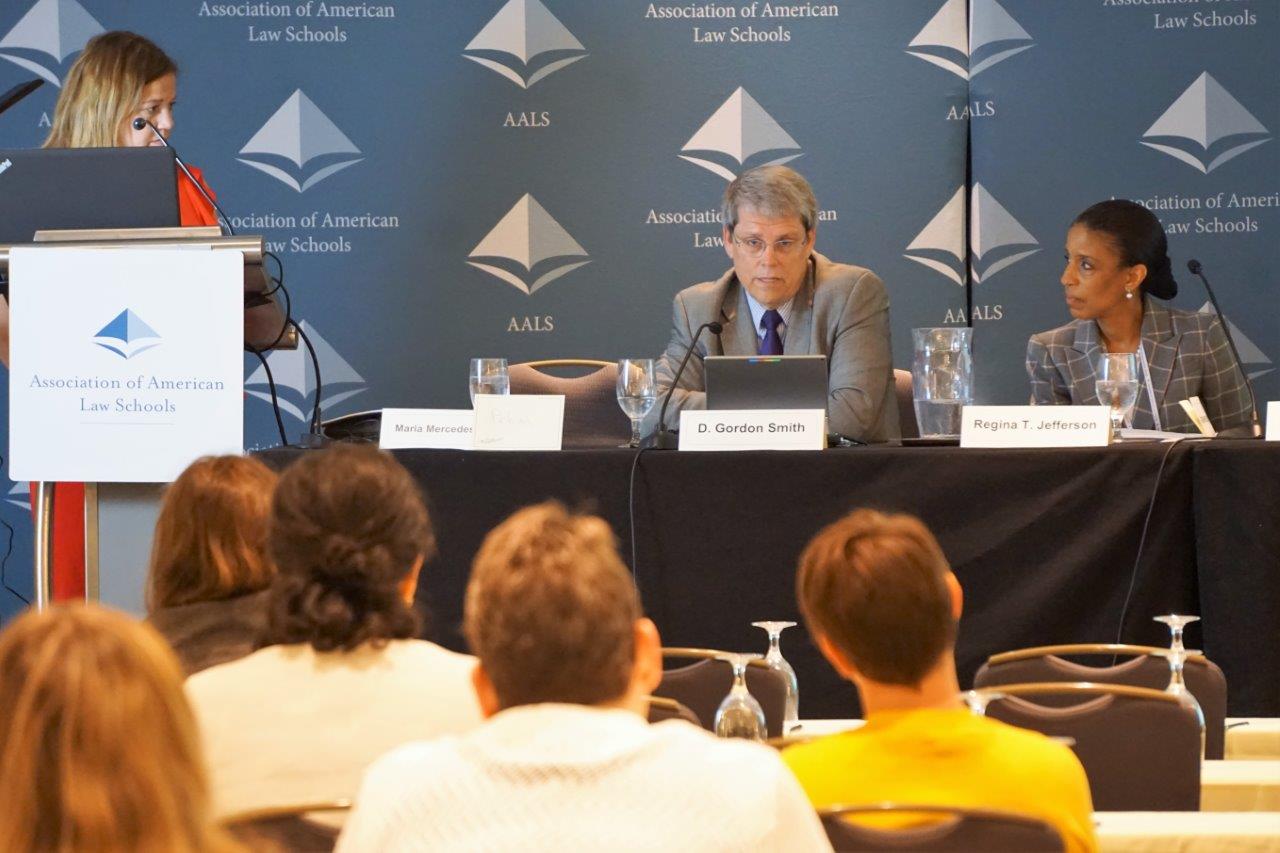 Panelists present during the plenary session, “Diversity and Inclusion Inside and Outside the Classroom.” L to R: Maria Mercedes Pabón (Loyola Law, New Orleans), D. Gordon Smith (Dean, Brigham Young University Law), and Regina T. Jefferson (Catholic University Columbus School of Law.)
Panelists present during the plenary session, “Diversity and Inclusion Inside and Outside the Classroom.” L to R: Maria Mercedes Pabón (Loyola Law, New Orleans), D. Gordon Smith (Dean, Brigham Young University Law), and Regina T. Jefferson (Catholic University Columbus School of Law.)
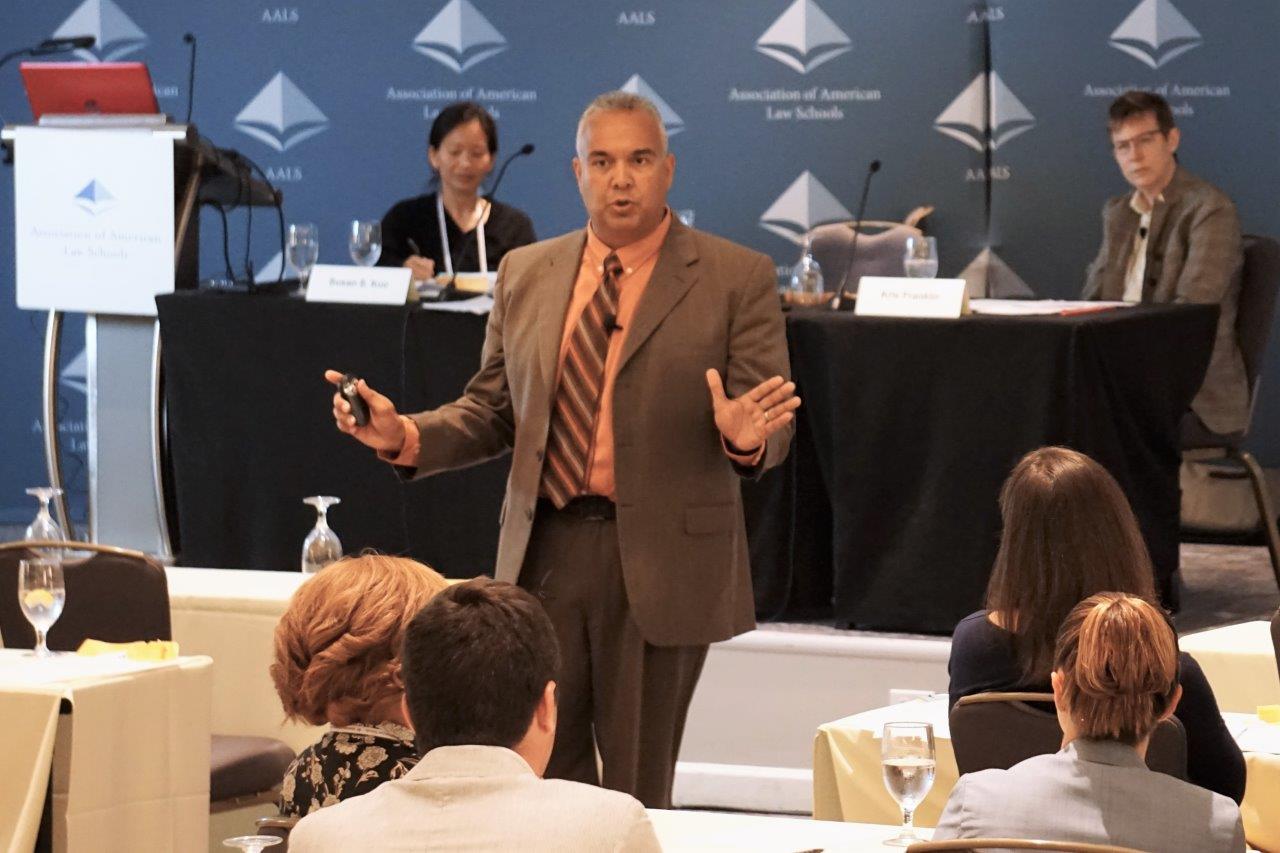 Rory D. Bahadur (Washburn Law) presents during Saturday’s plenary session on assessment with Susan S. Kuo (University of South Carolina Law) and Kris Franklin (New York Law School.)
Rory D. Bahadur (Washburn Law) presents during Saturday’s plenary session on assessment with Susan S. Kuo (University of South Carolina Law) and Kris Franklin (New York Law School.)
Small groups from the first night of the workshop also had an opportunity to reconvene and reflect on their experiences. The workshop also included informal breakfast and evening receptions with volunteers from AALS sections including the Section on Minority Groups, the Section on Sexual Orientation and Identity, and the Section on Women in Legal Education.
“When we sat down to create our vision for the workshop, we thought about how much has changed in the legal academy. Our challenge was to preserve the essence of what has been successful in previous workshops while adjusting to the new challenges that beginning law faculty face,” Professor Kuo said in discussing the planning committee’s approach to developing the workshop. “With these changes in mind, we asked speakers and panelists to model engagement that is characteristic of innovative teaching and inclusive pedagogy. The workshop also placed an emphasis on opportunities for group discussion and developing peer networks, because we knew much of useful information conveyed would come from the participants themselves.”
As part of the networking opportunities provided for junior faculty through this workshop, attendees are invited to participate in a reunion at the 2020 AALS Annual Meeting in Washington, DC this January to reflect on their first semesters in the academy.
“At the workshop I attended as a new professor, I was fortunate to meet another new teacher who shares my teaching subject area. We supported each other through our first year and remain close friends today. The reunion at the AALS Annual Meeting is a great idea and an opportunity for workshop participants to reconnect after a busy semester and develop those lasting friendships,” said Professor Kuo.
The planning committee for this year’s workshop was chaired by Susan S. Kuo (University of South Carolina Law), and included Aaron H. Caplan (Loyola Law School, Los Angeles), Sarah B. Hadjimarkos (University of Wisconsin Law), Michael J. Higdon (University of Tennessee Law), and Naomi Jewel Mezey (Georgetown Law.) AALS is thankful for their service and leadership.
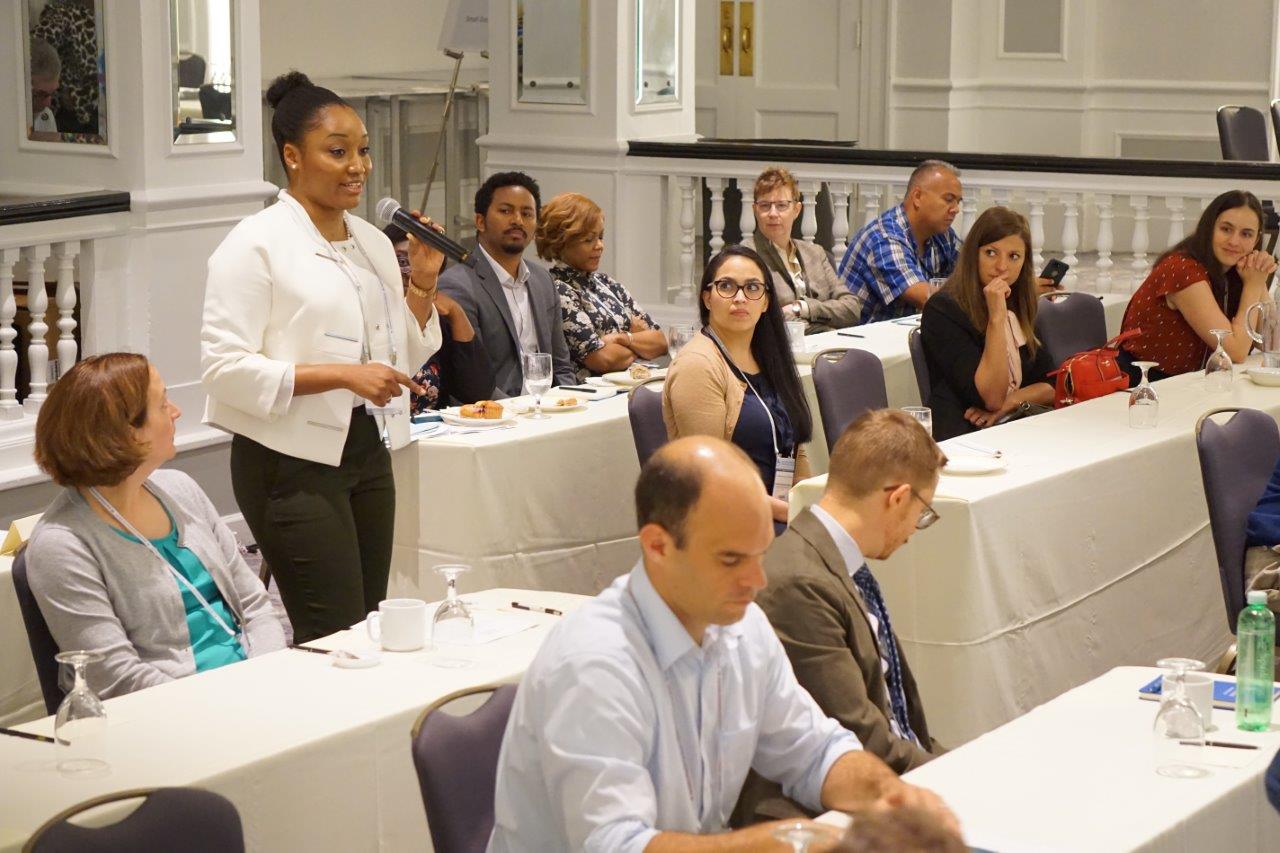 Reni Saula (George Washington Law) asks a question during a plenary session on diversity.
Reni Saula (George Washington Law) asks a question during a plenary session on diversity.
